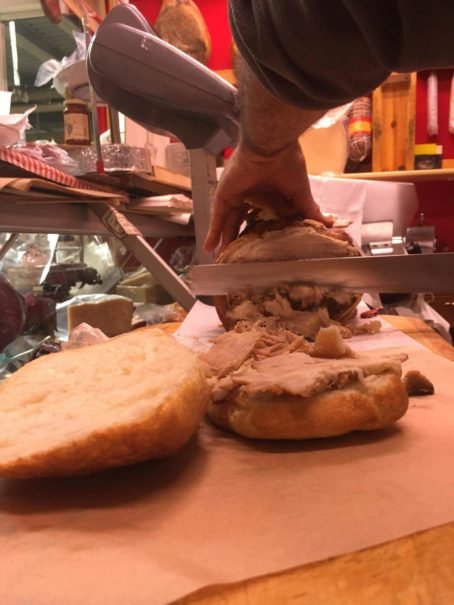
There’s A Lot Riding on This Pork Sandwich

There’s A Lot Riding on This Pork Sandwich
Porchetta in Rome
It is midnight on a Saturday in Rome, and there is an air of silent devastation at our table. We have eaten a bad Chinese meal. There is prolonged bickering, erratic blaming, contemplation on the confusion that globalization brings. We wonder if our chefs were really Chinese. And what we should drink to erase the memory of the last hour.
It’s a tense hour, but I suggest, to a hum of agreement, that the next days should be about culinary redemption. Someone announces “porchetta!” and we have consensus about breakfast tomorrow, and a glimmer of hope.
The first time I ate porchetta, my Indian stomach did not understand it. There was no dressing up of flavors, no daylong stewing, no fuss. It was stand-alone meat and bread, but it was perfect. I used to gawk at the plates of ham and tomatoes Italian friends presented to me proudly, aghast at how easy they made cuisine look.
My favorite porchetta in Rome is at Mercato Trionfale—an ocean of hard cheeses, fresh fruits, and competing Italian grandmothers in the center of the city. A perfect porchetta is a pork roast, prepared after laborious gutting and deboning, and roasted for hours over wood. The meat is moist, salty, herbed and violently fragrant. Usually eaten inside a panini, a good porchetta sandwich has a reasonable amount of fat, not too much, definitely not too little, and as a Roman friend solemnly told me in my first days in the city is “all about the correct balance. Like life.”
Though porchetta is native to nearby Ariccia, it is eaten all over Italy. The Tuscans sometimes eat it in flat bread, in Umbria the pig is stuffed with its own entrails, but the sandwich, which can be traced back to different historical periods in the city, lives up its full potential in Rome.
Today, a lot rides on my breakfast. There is the challenge of redemption from the frozen shrimp we ate last night, and it is two years after my first, young, impressionable visit. This time around, the trip has been trying. I am a frequent visitor and not a first-time tourist, less easily enamored, a self-proclaimed aficionado of the Italian kitchen.
At the market, it takes five minutes to find the porchetta—in shining, pink glory and in the process of being carved by a balding man named Nino. We run towards him, urgent in mission, and he chuckles as he takes out his knife. “In one hour it is lunch!” he scolds, as he hands us bread stuffed with pork he has been working on all week.
With one bite, Nino’s porchetta does everything I hoped. It heals me of yesterday’s regrets, prepares me for my new experience of Rome, and rids me of the skepticism I was afraid I had acquired. It’s almost closing time, and Nino packs up his leftovers for the next day. We get some to take home. The porchetta is still a home away from home.